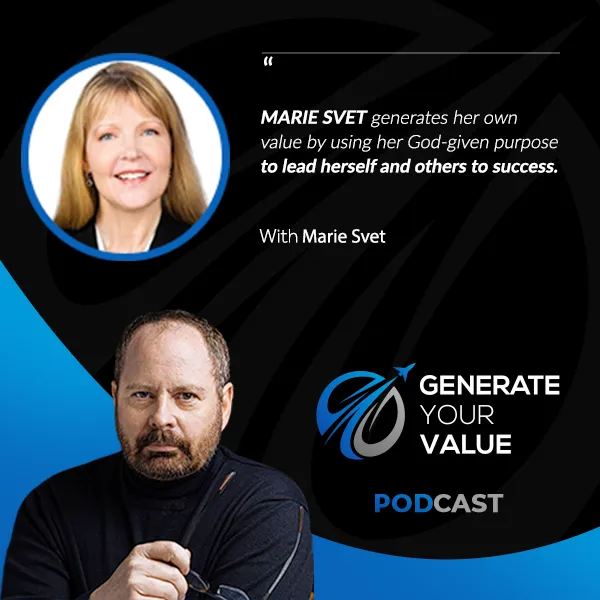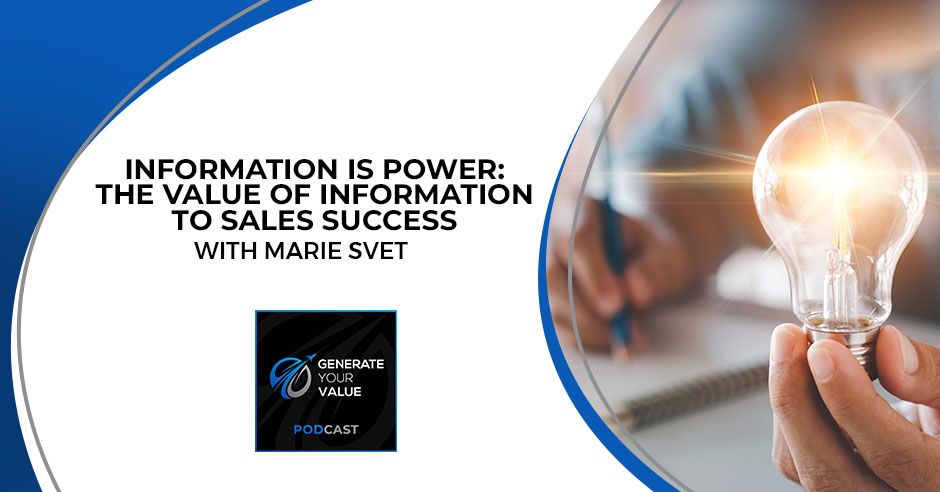“The most successful salespeople tended to be introverts.” – Marie Svet.
You would think that extroverts, those who are outgoing, are successful salespeople. Sorry to disappoint you, but you’re wrong. In this episode, Marie Svet, a Revenue Consultant, dives into harnessing the value of information to position your business for success. It will position you at an advantage if you listen to clients because that’s how you gain information. Andy McDowell also highlights how the power of information influences those around you. Meanwhile, Marie shares her side hustle. Tune in to this episode and learn to harness information to produce an outcome for your business.
Connect with Marie Svet through:
Twitter: @msvet
Instagram: @svetstagram
Instagram: @tiny_kitchen_baker
LISTEN TO THE PODCAST HERE
Information Is Power: The Value Of Information To Sales Success With Marie Svet
Welcome to the show. Unfortunately, my partner in crime, Zach Levi, is under the weather. He couldn’t make our interview. We wish him all the best in his recovery. No worries. He will live. It’s not anything earth-shattering. It’s one of those common things that we all deal with in life. We wish him the best. I got a great guest for you. It begs the question, “Where does she have the time?” It’s not on my list of questions to ask her but it was something that’s been mulling in my mind as I was reading through her bio.
We’ve brought you a guest whose bio is 1.5 pages to 2 pages with all the accomplishments and value that she has brought to the world from that standpoint. You sometimes have to sit back, look at it and go, “Where is the time, that most precious resource that we have?” It’s limited. It doesn’t grow on trees so to speak. It’s not abundant in the world. Time is time. I want you to ask a question for yourself as we go through this conversation and interview with our guest, which is, “What about that thing called time?”
I’m going to bring her in a minute. My guest is Marie Svet. Her bio is amazing. Our time is limited in how much I can bring you in an episode before you start switching us off so we have to limit our time in the conversation. I’m going to hit some highlights here. Marie is a master in combining sales, finance and marketing. She has worked for the likes of AccuWeather and WWE. She turned AccuWeather into the number two provider behind The Weather Company, which is the parent of the Weather Channel, from a revenue perspective. She spun around the world and worked for USA Networks, the precursor to YouTube. The list goes on and on.
She has a side hustle, which we’re going to get to at the end of the conversation. To those that are thinking about a side hustle, I want you to read the conversation. Marie holds an MBA from the New York University Stern School of Business and a BS from Syracuse with a triple major in Advertising, Psychology and French.
Syracuse University has a stellar program when it comes to broadcasting, journalism, marketing and all those types of things. You may not know that. I want you to understand that. Go look at all the journalists, TV people and so forth and their backgrounds. You’ll see Syracuse popping up over and over again. I’m going to stop there and let her tell the rest of the story through our conversation.

Marie, it’s been a while since our last conversation. I’ve been waiting for this day to come. Welcome to the show. Thank you for taking that valuable resource, your time, to come in and talk to our audience.
It’s so great to be here. It’s been quite a while since we last talked. I’m glad we finally got to do this.
For my first question, we were talking about it a little bit in the green room. I didn’t mention it. It’s in your bio. I was saving it for the first question. Coming from Boeing and the airline industry, I saw this term a lot in people’s titles but you don’t see it everywhere. It’s specific to certain industries, which I find interesting. The term is revenue management.
I worked on the operational side of airlines in the FAA, air traffic control and so forth. I didn’t get heavily involved with sales, finance and marketing types within the airline industry. Help myself and our audience understand what the term revenue management means and what kind of things fall under that purview within a company.
It’s so interesting because as many people don’t know what it is, I’ve never been asked about it, like, “What’s the difference between sales and revenue management? Is it finance?” Sales is sales and finance is finance. Revenue management sits in the middle in its special little place. Simply put, it’s about applying analytics to your sales data. That includes your expenses so the cost of goods sold. By applying those analytics, you’re able to figure out how to maximize a company’s profitability. In its purest form, that’s what it is.
What you’re looking at is aligning your products and services with the company’s overall vision and making sure that it aligns also with the brand messaging out there. A quick example is you wouldn’t be pricing your product for $5 if it’s a luxury good, like a watch. That doesn’t align. You are looking at that alignment. You’re looking at making sure that you are making offers optimally priced for the right targeted audience segment.
Some products need to be retired because they’re not making enough money. They drain the company. It’s about the pricing. It’s the go-to-market strategy. It’s the pipeline that’s being built. It’s how efficiently you are doing it and what systems you create to tie it all back to the vision and the brand and get the most juice out of the squeeze.

As I was listening to you, it sparked a question in my head. With product management, within Boeing, we had product managers that had a specific product and they were responsible for the marketing, revenue and sales. They were in charge of the success of that particular product or service. Is somebody the head of revenue management, like the head of the success of the line of products or services within the company?
You answered the question because revenue management is looking at all of the products and services as a whole, not one particular product. It’s an odd thing because, in all these years, I have not seen too many job descriptions come across my desk for a director of revenue management or something. It is starting to change a little bit but for the most part, I never did.
I would end up having a conversation with people, typically salespeople, a COO or a president of a company. I’m like, “I can help you with that. I can look at this.” I would end up creating a job for myself to come in and help them by taking a look at the whole process from beginning to end. I’m like, “You have these existing assets. How are you making money with them? How is your sales team going out into the marketplace and offering them?”
It touches on the product, a lot on sales, marketing, a tremendous amount and then on finance. That typically happens when it comes to forecasting. That’s where I would interact with finance the most. I’ve been asked, “Can you come and do financial planning and analysis in my team?” I’m like, “I’m not a financial person,” so you leave out speaking to the salespeople and the market.
Looking at the end of every year, I’m like, “How are we going to set the budget for next year?” Finance typically would be like, “Top-down. Whatever we made, let’s put a percentage on top of that.” In sales, they’re like, “We don’t know if we can get there.” They’re going to sandbag. I’ll say, “Let’s look at the whole market. First off, where’s the vision for this company? Where are we going to go? Let’s then take a look at the whole market and build it back up. Does that make sense given what the externals are? You’re not selling in a vacuum. You’re not a company in a vacuum.” That’s what it is.
It sounds like it’s a mixture of a lot of different things with product management, corporate strategy, finance and sales.
There’s a tremendous amount of strategy in it. I would rather it be standalone and be called strategy or growth but it touches a lot.
It’s like the conductor of an orchestra. You can make that analogy to say, “The brass section is sales. The string section is marketing.” It’s making sure that we’re all in alignment and playing our notes correctly at appropriate times to create this beautiful music song or whatever you want to call it that’s going to bring value to the audience.
What do you think is the most important ingredient since you work with sales quite a bit? We haven’t had many guests on yet so far that are directly involved with sales. Is it communication with a client? Is it the actual definition of the product or service? Is it truly meeting a need in the marketplace? Is it “sales” itself or is it relationship-building?
The number one most important ingredient when it comes to sales is listening. You can build a relationship but to build it, you have to listen. It is so interesting having either overseen sales teams or been part of sales teams or interacted with all these sales teams over the last few decades. The most interesting thing I noted was that the most successful salespeople tended to be introverts. You would think it would be the extroverts. Those are the ones who are the most outgoing, in your face and are like, “Let’s party all night. I’ll show you a good time,” like me but it is the introverts. When I say that they were more successful, I mean 4X factor successful. I started to pay attention to them.
The most successful salespeople tended to be introverts.
This one person, I always called the Johnny Depp of ad sales because he marched to the beat of his own drum. I say, “What is it about him?” One of the things I’ve noticed is that on a Monday, you’d go up by his office and be like, “How are you doing?” He’s like, “It was great. How was your weekend?” You would start telling him all about your weekend and be like, “How was yours?” He’s like, “It was great. I got to go.”
He would never talk about himself. He listened constantly. When it was time to make the ask, he would always put it in such a way that you felt heard as a buyer. It is because he hit on every point. You never felt like you were being sold to. He was the most unassuming, quiet guy there was. It was amazing to me. I worked with him at WWE. I have seen that type of introversion play out successfully in every other job I’ve had.
It hits home with the phrase, “Are you listening to respond or are you listening to understand?” Maybe I’m left field with this but extroverts may be more in the category of listening to respond as opposed to introverts that are listening by their nature. They are not trying to respond immediately with something in an effort to sell.
They’re listening to understand and then have the ability to connect the dots. It’s a true builder of relationships. I’m trying to understand where you’re going and what you feel like you have as obstacles in getting there. We may not be able to but I’m listening to try to understand how we could be a partner with you in that and how our product or service can help you on your journey.
I agree because in listening to the answer, how much are you really hearing? Nothing.
Do you think salespeople get too attached to the outcome? The only thing I’m attached to if you want an outcome walking in the door into a person’s office is to listen and understand. Who knows? I might get a piece of information that’s going to be more valuable than the actual dollars to the revenue with a sale here. I might walk away with a piece of information that’s going to help with the strategic growth of my company that we’re not aware of but in the nature of how I approached this time together with this person. I’m not attached to the outcome. I’m looking for any golden nuggets in the conversation. I can either, A) Help them move forward or, B) Help us move forward as a company.
Most people are attached to the outcome of whatever they do. Someone unattached to the outcome is always going to have a leg up based on that alone. I’m going to get so roasted by salespeople for saying this.

That’s what we’re all here about. Stir the pot. Go ahead.
Here it is. A lot of salespeople, good majority of them go in and they are tied to the outcome of what is going to hit their wallet. That is not even about the company. It is about the commission to be made. I was a chief revenue officer and I used to like to say I was a chief profitability officer. That’s what I should have been. It never made sense to me when I wasn’t part of the sales team or I was an adjunct to them. The salespeople would give away $2 million worth of freebies to make that $1 million sale. That made no sense to me. They were going to get commissioned off of the $1 million. It doesn’t matter that the company is out of $2 million and its net is down. That made zero sense.
Once I was in control of the sales team, that stuff went away. I would replace those types of salespeople because I wanted them to be looking at the total revenue or the profitability. That’s not necessarily what a salesperson is going to do unless their compensation is tied to profitability or margin. When you talk about the outcome, are you focused on the outcome? Are you agnostic? It comes down to most people are going to be attached to the outcome but if you make the outcome something that benefits everybody, then it can be a win-win across the board. You have to be strategic about that. It has to be thought of way in advance. It’s got to be part of the vision.
It has a lot to do with the culture of the organization. It used to drive me crazy when companies would espouse certain values and broadcast them as part of their culture and so forth. They put together incentive programs, particularly for senior leadership and so forth, where the people are not even measured on those values. It’s all on the bottom line. It’s profit sharing.
There’s an assumption made like, “If we’re making a ton of money, it’s because we have this kind of culture, values and so forth.” If you’re not ensuring that your senior leadership is being a model in that, then they’re going to go do their thing if it brings in more money. It may be against whatever culture you’re trying to build. Sales is a little microcosm of that issue since it is typically so commission based.
What do you feel is the most important concept that a leader must know in an effort to bring value creation to the table for business? What is it if you’re this orchestra leader that’s looking at the different sections, trying to organize it and the most important piece is the value creation because that’s what’s going to bring in the revenue? What are 1, 2 or 3 important things that people should keep in mind if they want that kind of role or direction within a company?
It ties into the previous questions that we went through. It is listening and it is about alignment. We talked about that. Those two are huge and leading by example. If you’re going to go into leadership, you should have a very clear vision of what it is that you’re trying to do. That should be communicated down the chain so that everybody knows, “Here’s the goal. This is what we’re doing.” We can all row in the same direction. As part of that, it is knowing where your job fits into that to help or support that vision. It’s like, “I’m not just some accounts payable clerk doing some boring job. What I do adds value and here’s how.”
If you’re a leader, you should have a clear vision of your goal. That should be communicated down the chain so that everybody knows the goal.
It’s not that difficult as a leader to be able to impart what that value is, how it is important and how it all plays together. In accounts payable, if things don’t get paid, then the trains are going to go offline. You got to get the trains back on track. It is listening to people in terms of what they’re doing and what matters to them.
A lot of times, when something goes wrong, it’s a very knee-jerk reaction to throw a lot of money at it, get more salespeople and pay them more when if you listened, maybe someone in IT wants to move into marketing. I’ve had situations where some great ideas have come out of someone. Marketing ideas have come out of a person in IT. It is being open, listening to your people and then leading by example. You’re not too good at anything. You can roll up your sleeves. I would never ask someone to do something that I wasn’t willing to do myself. That creates value because people are in a safe environment where they feel like failure isn’t going to be laughed at.
There’s no such thing as failure. They’re ideas and things to brainstorm against. If you create an environment and a culture that is open, transparent and listens to everyone, that hierarchy goes away. We’re all human beings. Suddenly, I’m not afraid to express this crazy idea I have for finance when I’m in sales. It might help the company save money or whatever it happens to be. Demonstrating that however the leader can is acceptable. That’s exactly what we want. Creating that safe environment and safe culture is where value creation or idea creation is going to be at its peak in a culture like that.
I couldn’t be in any more direct alignment with you on that issue. I’ve been on over 50 podcast interviews. People like to talk to me about creativity, both in personal life as well as in business. Everything you said is everything that I espouse too and talk about in those interviews. You’ve got to create that emotionally safe environment to allow the ideas to come out and be considered. At the end of the day, as a leader, you’re going to make the final decision as to which one you’re going to move forward with. As human beings, we all want to be seen and heard. Even if their idea is not taken under the wing and moved within the company to make the person feel like they were heard and respected in their idea, it will pay dividends big time in employee engagement.
You need to create that emotionally safe environment to allow the ideas to come out and consider.
Keeping them engaged is so important. People don’t leave bad jobs. They leave bad bosses. If your boss is a terrible leader and you don’t feel heard or appreciated and you don’t feel safe enough to express ideas that might come out of the left field, you’re going to leave. It’s not good for the health of the organization to lose people like that.
Let’s move to a different topic. I need to do a little setup before I get to the question. You worked for WWE, AccuWeather and a precursor to YouTube. Everything’s in the data information and entertainment realm. Historically speaking, back in the day when I was getting my Master’s in computer information systems, the topic was all around how we use IT to become more efficient and quicker to the market.
It is those types of comments where it’s like, “We are a manufacturing company. This is our product or service.” That’s how we think of ourselves like, “We are an airplane part company. We are a food manufacturing company.” That’s the industry. We identify ourselves by the product or service that we make. That’s how we think. When we start thinking about data, information and so forth, it’s helping us to be a better aircraft part manufacturing company because that’s how we identify ourselves.
As we were talking in the green room, I watched a video of Simon Sinek speaking in front of a bunch of leaders at Four Seasons. We all know it is a very high-end luxury resort company that brings a particular kind of experience. He was asked the question, “Where should Four Seasons be going? If you’re an influencer and can see into the future, what do you think we should be working on?” What it challenged him with is everything in the world is moving towards data and IT. Are you a hotel resort company that happens to use technology to do what you’re doing better, faster and cheaper or are you a data information company that happens to use hotels and resorts as your product and service? It becomes a mindset challenge.
I tried to do the same thing before I left Boeing. I did this because the guru of strategy, Peter Drucker, at Harvard Business came out with an article that talked about this system of the system look. It said that IT is going to connect to various systems within an ecosystem. In my case, it was the whole aviation system. The companies that have the most leverage and ability to be successful in a new environment is the company that makes the player. In our case, it is the airplane. The airplane is the actor within this ecosystem.
I was trying to convince the company that we needed to stop thinking of ourselves as an airplane company and more of a data IT company that happens to concentrate on the aviation industry and makes the main player or actor within this ecosystem. A lot of companies are struggling with that change in mindset or transformation that needs to occur as we move into the digital arena. I know I threw a lot at you. You’re one of the few guests that I’ve had that has that vantage point that could see whether companies can make that transition. Is that going to separate the wheat from the chaff so to speak? In the coming ages, can those companies change that mindset?
My thought is it’s pretty old-school for a company to define itself based on the product or the service that it sells, makes or creates. With that said, I’m not saying that everyone should change. I also think that on the far extreme to say, “We’re a data company that does XYZ,” makes me yawn. That sounds boring to me. There is a happy medium where a company transforms itself by leveraging data to define itself either by the problem that that data helps it solve or by the customer it serves.
For example, regarding my side hustle, segueing there a little, I could say that I’m a cake baker. I bake cakes and I’m a baker or as how I prefer it, I’m in the celebration business. I help people celebrate. To me, that resonates. You are a more attractive character if you are defining yourself by the problem that you solve or by those people that you’re helping specifically. That is where companies that need to transition and transform themselves will have the most success. It is when they focus externally rather than internally.

There’s always going to be resistance. The resistance will come internally from the people themselves. People hate change. That is going to be the biggest hurdle of all. How would I connect those dots? I know you didn’t even ask the question but I’m going to roll with it. I’ll connect the dots this way. It goes back to everything else I’ve been saying about listening, being transparent, the vision, communicating that and how everybody’s jobs fit in.
When a leader is frank and open and says, “This is what the market is. This is what’s happening in our ecosystem. We need to pivot and change. This is what we’re thinking,” instead of focusing on us, which is very 19th century, we’re going to focus on whom we serve, the problems that we solve and what we’re thinking. To change, it’s best to help create that change. If you invite your people in to have a say, be a part of it, that they are valued and heard and it is a safe environment to do it in, then you’re going to be able to overcome that resistance to change, which I believe is the biggest hurdle of all.
Where I felt the biggest orchestrator in my experience at Boeing, to lay out an example, was when my team was able to help facilitate conversation between air traffic control and airlines in an effort to redesign the airspace over Denver using GPS. Nobody’s listening to each other. You had the air traffic control and silos. Their major concern was capacity. Their mission statement is, “We have to handle all these airplanes and do it safely. That’s how we’re measured.”
In the airlines, it’s all about efficiency for us. Fuel burn is such a huge expense for our operation. What we care about is the flight profile that you allow us to take off and land at because it’s a huge part of where fuel burn occurs. We have these different drivers, which are capacity and efficiency. If you can be the orchestra conductor and facilitate that conversation, then all of a sudden, air traffic controllers are in-flight simulators with pilots. You’ve got this conversation going on in trying to fix this common problem and to be listening. Magic can happen. Magic happened in Denver. It became a model for the FAA to use in other cities around the country.
Another illustration of your point is to say, “Where is the problem in the marketplace? Don’t worry about the players at the moment. Where is it and how can it be solved? Whom do you need to bring to the table to solve that? Can we be a major player in helping to solve that, whether through our product and service or work within the industry? Where can we add that value, both revenue generating and non-revenue generating, that’s going to fix and solve the problem?” That will build the brand. It’s because you’re dealing with the value. Why do you think information is so powerful? We hear the phrase, “Information is power.” How is artificial intelligence going to change that? Is that something you have a thought on?
Information is power.
With artificial intelligence and how it’s going to change information, it’s always going to be garbage in and garbage out. It’s only going to be as good as how it’s used. That’s the only thing I could say about AI. In terms of why is information so powerful, that’s an age-old question and answer because whoever holds the most information usually wins. It’s the key.
That’s why marketing companies want so much data and information. It’s because if they can unlock exactly your head and heart’s desire for something, then they will be able to make the sale. They will get you to buy something that you didn’t even know you needed or wanted. You didn’t even know it existed. You didn’t have a problem but suddenly something that you thought was normal has become a problem so you better go get that. Data and information will get that for them.
Also, in the age that we’re in, we’re taking online and offline data and being able to marry up what we are doing when we’re not in the connected world. When you’re going out shopping and you pass by an electric car charging station and where that happens to be, there are little beacons. It will sniff you out on your mobile phones. It’s being able to take that anonymous data and match it up to other things that you’re doing. For a marketing company, that’s valuable information because they can track you on the entire path to purchase. It’s the moment you first even have a whiff of a particular product or something to the moment you go purchase it. You don’t even know that you’re being sold to along that entire path because you’re not necessarily aware of it.
Especially in this country, we’re incredibly over-messaged. There are messages at us all the time and we block them out because we are so over-messaged. The subconscious is taking it all in. Suddenly, you’ve got an urge to go by this widget that you didn’t hear of the day before. You never even knew it existed. That’s why information is so powerful. It gives so much more power keys to unlocking people’s behavior and being able to manipulate them, quite frankly. I don’t find that to be very ethical but isn’t that what it all ends up being? Sales and marketing is being able to use the information to manipulate people so that they can influence behavior.
That is the word I was about to go to. It is to be influential in trying to help or have a major influence in what I’ve called in my coaching and this show the most powerful tool that a human being has and that is choice. When I coach people that are looking to start a business and they’re working on a business plan, what usually comes out is that they want to write this 100-page document of a business plan to feel like they’ve done a quality job in trying to launch a business. I keep coming back going, “Stick to ten pages.” The most important part of it is writing down all of your assumptions. You’re making choices on what your business is going to look like based on assumptions that you have because you have imperfect information.
You need to be very flexible when you launch, be asking the right questions and be perceptive of what’s going on with your customers or lack thereof that’s either going to validate or invalidate your assumptions. You then make a choice based on that information, a lack of information or different information than what you originally had to be able to pivot. Make a choice to pivot in your business based on the information that you’re getting.
When you launch, you must be very flexible, ask the right questions, and be perceptive of what’s going on with your customers or the lack thereof. That’s either going to validate or invalidate your assumptions.
If you’re going along and paying enough attention, you’re going to get blatant information and not-so-blatant information. If you’re paying attention, that’s going to allow you to make a choice to pivot that’s going to lead to better success for you down the road with your business. The best choice is an informed choice. You’re trying to get to the truth of what’s going on. To me, that’s why information has power. It’s a descriptor of what’s going on. You’re going to make a better quality choice by having as much information as you can. It goes back to our conversation about the sales piece and listening. Listening to understand is going to allow you to gather that information that’s going to help you to make better quality choices in your business. A powerful tool is choice. Let’s get to the fun part.
I was having fun already.
It’s the even more fun part. Part of the reason why I wanted to bring you on as a guest is that you do have a side hustle. There are probably people out in our audience that have a side hustle, thinking about a side hustle or have great joy and happiness in an area of the world that’s outside of what they do for their career that they want to dabble into. I thought we might talk a little bit about your side hustle business called the Tiny Kitchen Baker. You alluded to it. I failed to mention that you’re based in New York City so tiny kitchens are fairly commonplace. You live in the New York City area so I love the name. Remind me, do you pretty much stick to cakes?
I do. When I originally started my business many years ago, it was whatever you wanted. I would accept any challenge. It was pies and cakes. My first sale was a prune cream pie but it’s always custom. It’s so odd. It was a challenge because it was this man’s grandmother’s 90th birthday and her favorite dessert as a little girl was a prune cream pie but no one made them. She couldn’t find them. He wanted to surprise her in the worst way. He didn’t even know what it was. I said, “I’ll do it.” I had no idea what it was.
I’ve never heard of one.
I had no idea. I didn’t know what to do but I did a ton of research. I raised my hand and said, “I’ll do it,” so I did. That was my first official sale. I stick to custom cakes. I can do the others. Sometimes, a family member will ask for something like cookies because I can whip out cookies like nobody’s business. I do like to stick to cakes because it’s a high-margin business. I practice what I preach in my life and business.
In the revenue management world, I do with my cakes. Cakes are a high-margin business for me because I price them also accordingly. That’s why I stick to them. It all comes down to a head versus heart with me. From a heart side, doing custom cakes takes a long time but I don’t even notice the time passing because it is such a passion that I lose all sense of time and space. I throw myself into it.
When I get a particularly big challenge like redoing Van Gogh’s Starry Night on the cake, that’s going to take a lot of time. It comes out. It’s edible art. I love art. I was creative in high school. I took a lot of art classes. I was in art shows. I went to a school for gifted artists. It came down to head versus heart. My parents were very practical. I wouldn’t say that they pressured me but there was always, “Think about your future.”
I didn’t want to be a starving artist. I had a girlfriend who had a similar thing going on. She was into music versus going into what she wanted to go into like economics or math. Ultimately, I chose my head. I chose to follow the business route rather than the art route because I didn’t want to be a starving artist. I thought, “I’ll do it in my spare time,” but it made my heart hurt.
For stress relief, I would still bake a lot. When my daughter was born, I was told that I’ll never have time to do anything until she is 30 years old. My time is hers. She would kiss sleeping at night goodbye. I had a unicorn baby. She ended up sleeping through the night at five weeks old. I was so bored like, “What am I going to do? I’m used to moving 100 miles an hour.” I was baking constantly and giving it away. Someone suggested that I start selling it and I was like, “No one’s going to buy this. Everybody bakes.” She’s like, “That’s not true. They certainly don’t bake like you.” That’s how I sold this prune cream pie.
The interesting thing is why baking? My family always baked. That’s why I thought everyone baked because everyone in my family bakes. They don’t bake and decorate cakes as I do. We’ve had a family cookbook that my great-grandmother created from all her little recipes and notes that have been passed down to me. It’s in my DNA.
The thing is that it is expression. It is a passion. It takes the sting away from working the dimes or getting your dimes covered, the day-to-day job. You’re not always going to be working for a great boss or leader. Sometimes, you can feel like a slave if you’re living paycheck to paycheck. There is no fun in that. To be able to turn around and have something that you control, there is ownership in terms of ideation and creativity. You can put your heart and soul into it. That takes a sting away.
It’s the same thing for me with photography, music, singing and playing the guitar. It’s where I can get out of the day-to-day doing the dimes to find that love and passion and connect with a heart from that standpoint. For the audience, you need to go out to her website and see the cakes that she makes because they’re phenomenal.
Thank you.
You can see the passion and the love that you have for doing it. It is built into the creativity of what you’ve done with cakes. It’s those types of cakes that you see sitting on the table. It’s like, “I don’t even want to get anywhere near with a knife. I don’t want to touch it with a knife.” It’s going to ruin the “creation” and the value that you’ve brought.
I have to imagine you’re selling it as a celebratory experience because part of the value gets destructed by the fact that people are eating a cake. The cake has a time limit by nature that it is a cake. You have to look at it as an experience to aid in the celebration. What would you recommend? What thoughts and advice would you have for somebody who wants to explore passion and make a side hustle?
If this side hustle is going to be a side hustle forever or it’s meant to grow, I would make sure that you have a strong why. If it’s your passion and you love it and you would do it for no charge anyway, then double down on that. That would be my advice. There was a book I read when I came out of college called Do What You Love, The Money Will Follow. I truly believe that with all my heart. If it’s a passion, then double down on it. Let it take you wherever it goes. There are ways that you can fund it if you need it to be funded but if you let your heart lead you, you’ll go where you’re meant to go with it.

I launched a side hustle with my photography. I launched a website to sell. People kept telling me for years, “You need to sell your photographs because they’re that great.” I launched a website. It’s GYVPhotography.com for those who want to go look. It’s to sell my photographs. It’s love. It’s a passion. I carry my camera around with me, traveling around the world for Boeing. It springs a great heart. It’s something I did for years at my cost for this sheer enjoyment of doing it.
I have been doing it since I was a teenager. I taught myself how to develop my film and do my prints back in the black-and-white world back when we were non-digital and film. I was locking myself in my bathroom with the lights off, funneling around with cartridges of film and trying to figure out where everything is and get it where it needs to be with the lights off before I start pouring the chemicals in and so forth to get it developed.
We’ll see where it goes. It’s out of pure love and passion for doing. Like you’re trying to bring in emotion through the celebration of your cakes, I’m trying to do the same thing with my photography. It’s to evoke a certain emotion that people will walk by every single day and feel that emotion. They have that kind of value delivered to them daily through the imagery.
I highly encourage everybody. If you have something like that in your life, explore the possibility of making a business out of it. You could share it in some way. Maybe you don’t want to make any money out of it but you want to share it with the world. It’s still bringing value. It may not be doing it for an exchange of value but it’s still going to bring value. It’s still going to be generating your value from that perspective.
You go to the About The Artist section on my website. I talk a little bit about how it’s one way that I try to generate value in the world. Speaking of which, our time is coming to a close. As our audience knows and understands and maybe some are anticipating it, we always end our conversations with our wonderful guests with the same question. We like to collect the answer. There is no right or wrong answer. It’s about what’s in your heart and life. Marie Svet, what are the words generate your value mean to you?
This goes back to what we were talking about following your passion. I believe that we are all given a value and purpose at birth. It is God-given. It’s up to us to figure out what that is. Generate your value is a reminder or a call to focus internally to figure out what your God-given purpose and value are rather than being told or having someone externally validate you and tell you what your value is. It’s meant to make sure that you decide what that is that is internally generated.
We do that through self-leadership. If we’re self-leaders, then we’re being introspective in working on the life journey to figure out what that is for ourselves. It’s that purpose or that why and what value can be generated from knowing that.
It’s self-leadership with an internal locus of control. The key differentiator for me with that phrase is that it’s self-generated.
I can’t thank you enough for taking your valuable resource called time to come to share your wisdom with the world through our channel or avenue.
Thank you so much for having me.
For our audience, I hope that through myself and Marie taking the time out to do this conversation, you got some golden nuggets out of it, some a-ha moments or something that you can use to integrate into your life, career and relationships that will allow you to grow into your purpose and why. Also, allow you to generate and maximize the value that you generate in your life as you go along on this journey with Marie and us. We are human beings. You’re a human being. We’re walking along this journey or path with you.

We may never have met but that doesn’t mean we’re not walking along on the same path with you in life to hopefully find a way to make this world full of love. It’s not division or fear but love. That’s the end game. That’s what drives us with joy, happiness, side hustles, passion, your why and everything else. If that was a flower and you pulled all the petals off of it, what you would be left with is a stem of love. That’s what we’re trying to get you to see and live.
Our mission here at the show is to inspire you to think about these things and live to your fullest as you go down the journey of life. Hopefully, it will be successful. It may not be but we’re going to give it our best shot. We’ll try to be here every Tuesday on our weekly episodes to have a movement within this world. It’s where we take the stem of love and find our passions that grow the petals that allow us to be a flower of value in the world.
That’s my analogy for this episode. I love analogies. I try to use them as much as I can in my coaching. I hope you can see that. With that being said, have a great time. We’re coming up at the end of March 2023. Hopefully, we have a great month of April 2023. Let’s keep centering on love and working on generating our value in the world. With that being said, take care. Thanks for reading.
Important Links
- Marie Svet – LinkedIn
- @MSvet – Twitter
- @SvetStagram – Instagram
- @Tiny_Kitchen_Baker – Instagram
- Do What You Love, The Money Will Follow
- GYVPhotography.com
- About The Artist
About Marie Svet

Driven by a genuine interest to learn and understand other people’s viewpoints, Marie is able to effectively work with people in diverse functions, at all levels and in different industries. Her multifunctional and multicultural experience coupled with strong interpersonal skills ensure success working with unique personalities whether in media, entertainment, investment or boards.
Her sales acumen and capacity to overcome relational challenges at the individual and organizational levels are recognized both domestically and internationally. China’s Meteorological Association specifically requested her advice when developing its sales strategy and operations. A few years later they sought her counsel again to further expand and continue to grow.
In her last corporate role, Marie was the global chief revenue officer for AccuWeather, leading ad sales, strategy, operations and marketing for all of AccuWeather’s media channels: desktop, mobile, television, radio and digital out-of-home. She transformed the company’s annual advertising revenue into monthly revenue in 5 years. Due to the effectiveness of her breakthrough strategic initiatives and leadership, the company was able to produce record-setting results for 7 consecutive years, establishing the company as the #2 US weather provider behind The Weather Company, beating out CNN, Yahoo, MSN and AOL. The digital ad industry also recognized Marie at this time by naming her one of the Top Women in Digital.
Marie’s success at AccuWeather propelled her to become a revenue consultant focusing on digital transformation, pricing and go-to market strategy for entrepreneurs and mid-sized organizations. When she is not helping clients maximize their commission-based revenue without losing their key salespeople or leaving money on the table, Marie spends her time growing her passion and side hustle, Tiny Kitchen Baker, @tiny_kitchen_baker – an online, custom cake design shop.
Marie’s road to success was not linear. Her non-traditional, self-directed career path most-resembled a rotational, leadership development program, providing critical opportunities for training as a general manager. She spent the first 10 years of her career on the advertising agency side of the media buying business as a national television media buyer. In this role, she negotiated multi-million dollar deals on behalf of her advertising clients.
Marie went on to hold diverse roles in affiliate sales, sales strategy and sales operations at USA Networks, The FeedRoom (a pre-cursor to YouTube) and WWE. It was while at WWE that Marie formed her first culturally and geographically diverse, cross-functional team. In this unique role overseeing revenue management and sales strategy with a team of subject matter experts from marketing, sales and finance, she implemented a clever cross-divisional plan to reduce the company’s liability. The results were a 93% reduction in ad sales liability in just over a year while simultaneously increasing ad sales revenue by 13% despite a declining ratings market. It was at this time that Marie also began informally serving as a translator and link between the finance and sales departments. In this capacity, Marie acted as a “cultural broker” to allow the different functions to collaborate with minimal disruption.
Marie has made significant contributions to her industry through her 15-year volunteer service on the Board of Directors of Women in Cable Telecommunications’ NY Chapter. She served as WICT NY’s President for an unprecedented, three consecutive years, during which she founded the Chapter’s award-winning, executive mentoring program, Prime Access. In addition, she is an advisor and supporter for several non-profit organizations.
Marie resides in Manhattan with her college-aged daughter. She holds an MBA from the NYU Stern School of Business, a BS (Triple Major in Advertising, Psychology and French) from Syracuse University (The Newhouse School) and a certificate in European Management also from Stern. She is an avid Chi-runner/trainer, completing 56 half marathons & 13 marathons, as well as an international traveler, certified nutritionist, advanced yoga instructor and competitive body builder.







